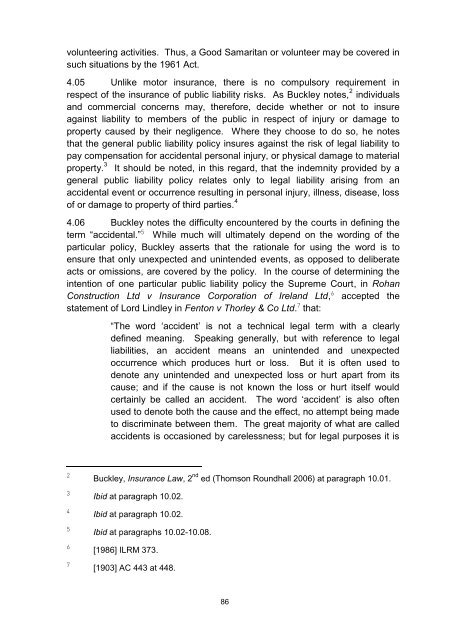civil liability of good samaritans and volunteers - Law Reform ...
civil liability of good samaritans and volunteers - Law Reform ...
civil liability of good samaritans and volunteers - Law Reform ...
You also want an ePaper? Increase the reach of your titles
YUMPU automatically turns print PDFs into web optimized ePapers that Google loves.
volunteering activities. Thus, a Good Samaritan or volunteer may be covered insuch situations by the 1961 Act.4.05 Unlike motor insurance, there is no compulsory requirement inrespect <strong>of</strong> the insurance <strong>of</strong> public <strong>liability</strong> risks. As Buckley notes, 2 individuals<strong>and</strong> commercial concerns may, therefore, decide whether or not to insureagainst <strong>liability</strong> to members <strong>of</strong> the public in respect <strong>of</strong> injury or damage toproperty caused by their negligence. Where they choose to do so, he notesthat the general public <strong>liability</strong> policy insures against the risk <strong>of</strong> legal <strong>liability</strong> topay compensation for accidental personal injury, or physical damage to materialproperty. 3 It should be noted, in this regard, that the indemnity provided by ageneral public <strong>liability</strong> policy relates only to legal <strong>liability</strong> arising from anaccidental event or occurrence resulting in personal injury, illness, disease, loss<strong>of</strong> or damage to property <strong>of</strong> third parties. 44.06 Buckley notes the difficulty encountered by the courts in defining theterm “accidental.” 5 While much will ultimately depend on the wording <strong>of</strong> theparticular policy, Buckley asserts that the rationale for using the word is toensure that only unexpected <strong>and</strong> unintended events, as opposed to deliberateacts or omissions, are covered by the policy. In the course <strong>of</strong> determining theintention <strong>of</strong> one particular public <strong>liability</strong> policy the Supreme Court, in RohanConstruction Ltd v Insurance Corporation <strong>of</strong> Irel<strong>and</strong> Ltd, 6 accepted thestatement <strong>of</strong> Lord Lindley in Fenton v Thorley & Co Ltd. 7 that:“The word „accident‟ is not a technical legal term with a clearlydefined meaning. Speaking generally, but with reference to legalliabilities, an accident means an unintended <strong>and</strong> unexpectedoccurrence which produces hurt or loss. But it is <strong>of</strong>ten used todenote any unintended <strong>and</strong> unexpected loss or hurt apart from itscause; <strong>and</strong> if the cause is not known the loss or hurt itself wouldcertainly be called an accident. The word „accident‟ is also <strong>of</strong>tenused to denote both the cause <strong>and</strong> the effect, no attempt being madeto discriminate between them. The great majority <strong>of</strong> what are calledaccidents is occasioned by carelessness; but for legal purposes it is234567Buckley, Insurance <strong>Law</strong>, 2 nd ed (Thomson Roundhall 2006) at paragraph 10.01.Ibid at paragraph 10.02.Ibid at paragraph 10.02.Ibid at paragraphs 10.02-10.08.[1986] ILRM 373.[1903] AC 443 at 448.86
















